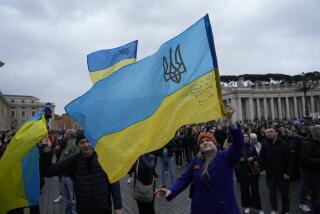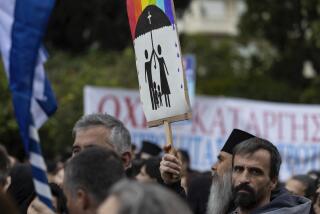Catholic-Orthodox Tensions Resurface
- Share via
MOSCOW — Ultranationalist parliamentarian Alexei Mitrofanov created a stir last week by advocating restrictions on Russian media coverage of Pope John Paul II’s death and funeral.
The initiative won the backing of 98 deputies in the 450-seat lower house of parliament -- far short of the needed votes, but a sign of how relations between the Roman Catholic and Russian Orthodox churches are still troubled despite the late pontiff’s deep desire for reconciliation.
The division between Catholicism and the Orthodox churches dates to 1054, when a French cardinal representing the pope excommunicated the patriarch of Constantinople, now Istanbul. Conflicts festered over centuries, as the Crusaders sacked Constantinople and overthrew the Orthodox-backed Byzantine emperor.
But in the years since the 1991 collapse of the Soviet Union, at the heart of the conflict has been the resurgent Russian Orthodox Church’s fears for its own identity and complaints about what it sees as Catholic efforts to proselytize its followers.
John Paul made some progress toward better ties with branches of the Orthodox Church outside Russia, visiting Romania, Georgia, Greece, Ukraine and Bulgaria during the later years of his 26 1/2 -year papacy. In Athens in 2001, he won goodwill with his public call that God forgive any sins Catholics committed “by action or omission against their Orthodox brothers and sisters.”
But he was never able to visit Russia, largely because of opposition by Russian Orthodox Patriarch Alexy II, who called the two churches’ estrangement a “religious war.”
Proselytism by any religion is sensitive because of Russia’s traditional attachment to Orthodoxy, explained Alexander Chuyev, vice chairman of the religious organizations committee of the lower house of parliament.
“This Orthodox faith is not only part of our history, culture and traditions,” he said. “It has become an inseparable part of other cultural phenomena, like architecture, literature, the lifestyle in general.”
Archpriest Vsevolod Chaplin, a spokesman for the Russian Orthodox Church’s Moscow patriarchy, said that for the two churches to build cooperative relations, “we need to stop competition in the missionary field.”
“After the breakdown of the Soviet Union,” he said, “a great number of people in the Roman Catholic Church decided that was the moment when it was possible to conquer these big territories and huge populations of the countries of the former Soviet Union.
“Many Orthodox people at that moment felt Roman Catholics were enemies,” he said. “What we hope for is, in the future, the Roman Catholic Church will behave in a truly brotherly manner toward the Orthodox.”
Archbishop Tadeusz Kondrusiewicz, president of the Russian Catholic Bishops’ Conference, agreed that the two churches needed to solve “the problem of proselytizing,” but described it in a different way: The Catholic Church in Russia is not proselytizing, he said, but both churches should recognize people’s right “to choose their religion.”
Immediately after John Paul’s death, Alexy, the Russian patriarch, made a gesture of goodwill in a message to the Vatican expressing his “profound condolences.” But he also alluded to the tensions.
“I hope that a new period in the life of the Roman Catholic Church will help to renew the relations of mutual respect and brotherly Christian love between our churches.”
The Russian Orthodox Church was represented at Friday’s funeral by Metropolitan Kirill, another key figure in the hierarchy. Throughout the week, the pontiff’s passing was given heavy coverage on Russian news programs, but no major station carried the funeral service live.
For Mitrofanov, the coverage was too much.
“After all, we are an Orthodox country,” he said in televised remarks. “Our media’s open and active participation in the Vatican’s propaganda effort -- when all day long we are being told about Vatican practices and traditions, about what is happening there and how -- is wrong. One should exercise more caution.”
Mitrofanov’s stance was far from universal in Russia and drew sharp criticism. Lawmaker Valery Komissarov warned that the proposal to restrict coverage “may seriously insult” Catholics around the world.
Anton Orekh, a commentator on Echo of Moscow radio, used sharper language.
“The greatest of our contemporaries has died,” he said. “It will not be an exaggeration to say that he was the last man who could be called a moral, ethical and spiritual example for the whole of mankind, whatever one’s religion is and whether one believes in God at all.... Let us at least refrain from behaving like idiots and disgracing ourselves before the world, staging discussions of idiotic initiatives like Mitrofanov’s.”
Estimates of the number of Russian adherents to the two churches vary widely, partly because of the difficulty of defining whom to count. But the number of Roman Catholics is often placed at about 500,000, whereas a large majority of ethnic Russians have Orthodox roots.
Many Russian Orthodox believers do not share the passion of their church leadership on the issues of conversions, and were open to the late pontiff’s message of reconciliation. Among them is Yelena Volkova, who was preparing to light candles in central Moscow’s massive Christ the Savior Cathedral when she was asked about the pope’s passing.
“He was a great person for all of us,” she replied.
“I’m very sorry that the pope didn’t manage to come to Russia,” added her husband, Alexander Volkov. “The pope could have been a great ambassador of peace.”
But others fear what the possible spread of Catholicism could do to Russian self-identity.
“There exist slight differences between our customs and traditions and those of the Catholic faith,” said Andrei Morozov, 55, a doctor. He attends church weekly and is fasting in the run-up to Orthodox Easter, which falls on May 1 this year.
“It is these little differences which make us unique and help us realize ourselves as a unique nation,” he said. “Look, we are already wearing jeans, drinking Pepsi-Cola, eating hamburgers, and we even send St. Valentine’s Day cards to each other.”
The division deeply troubled John Paul. Cardinal Lubomyr Husar, leader of the 5-million-member Ukrainian Greek Catholic Church, which gives allegiance to the pope but uses rituals very similar to those of the Orthodox faith, said in an interview last week that the late pope “had a deep, religious urge to establish a common ground for Christian unity.”
“He belonged to the same Slavic family,” Husar said. “He wanted to go to Russia to meet the people, to know the church, to establish a common ground -- not to convert them, not to impose himself on them. Simply to meet them spiritually.”
John Paul’s five-day visit to Ukraine in 2001 was preceded by days of street protests, as thousands of Orthodox faithful branded him the “forerunner of the anti-Christ.” The leader of Ukraine’s largest Orthodox church refused to meet with him, and Alexy complained that the trip would only “complicate” relations between the churches in Ukraine.
Nonetheless, more than 1 million people turned out to hear the pontiff preach.
Being Polish may have given John Paul a greater interest in establishing ties with the Russian Orthodox Church, but it also complicated those relations.
“His being a Slav and coming from Poland only aggravated the situation and the controversies between the Roman Catholic Church and the Russian Orthodox Church,” said Alexander Shchipkov, a religion analyst in Moscow. “All the centuries-long political disputes between Russia and Poland were interwoven into purely religious affairs. If the pope had not been a Pole, maybe the dialogue between the two churches would have progressed much faster.”
Ignorance and misunderstandings on both sides have prevailed, Husar said. He expressed hope that the next pope would have the same depth of spiritual commitment as John Paul had, but said the Vatican should lay out a clearer vision to the Orthodox of what unity could mean. That vision should allow the Orthodox “to be themselves,” he said.
“But we are not ready for this yet, even though we do not maybe say this in so many words,” he added. “We would like to integrate them into our way of thinking. We might feel that the greatest ambition of Alexy II is to become a cardinal of the Roman Catholic Church. This sort of thinking is not uncommon among Catholics, and this is one of the reasons for the failure to establish a common spiritual platform.”
But if the next pope keeps trying to break down the religious divide, a “miracle” might happen -- something similar, Husar said, to the unexpected collapse of the Soviet Union.
Still, some Russian Orthodox believers think a great deal of unity may not be so desirable.
“We must stay unique,” said Morozov, the doctor. “We must have our own way of doing things in order to survive. That is why I am against the Catholic Church spreading its influence over our Orthodox nation. I am proud and happy that for us Christmas falls on a different day, and that the Easter bunny doesn’t exist here at all. Let it stay that way.”
*
Times staff writers Richard Boudreaux in Rome and Sergei L. Loiko in Moscow contributed to this report.
More to Read
Sign up for Essential California
The most important California stories and recommendations in your inbox every morning.
You may occasionally receive promotional content from the Los Angeles Times.










